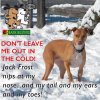No matter if you live where temperatures dip to freezing or if you reside in a milder climate, winter can bring some challenges for both you and your dog. You need to take extra precautions to keep both you and your furry friends safe and cozy regardless of the temperatures.
Know YOUR Dog and the Breed. Certain breeds are born to roam outside for long periods in the cold because their dense coats insulate them. These include:
• Akitas
• Alaskan Malamutes
• Eskimo Dogs
• Chow Chows
• Bernese Mountain Dogs
• German Shepherds
• Greater Swiss Mountain Dogs
• Great Pyrenees
• Keeshonds
• Kuvasz
• Newfoundland
• Norwegian Elkhounds
• Saint Bernards
• Samoyeds
However, just because your dog is strutting around in a fur coat doesn't mean he likes the cold. Every dog is different in their tolerance of temperatures be they hot or cold. Two common misconceptions are that all short haired dogs like it hotter than their long-haired friends, or all black dogs have problems tolerating the heat.
What's important as pet parents is that you know how to recognize signs your dog may be cold including shivering or wanting to hightail it back to the house.
Check Their Paws. Although certain breeds have tougher paws than others, ice and snow can get caught up in the webbing between their toes and even cut the toe pads. And just like humans, dogs can get frostbite and hypothermia. Symptoms may include: swelling, blackened or dead skin, and discoloration of the skin (mainly pale, gray or bluish). Consider getting dog booties to protect your pooch's feet.
Not For Dogs. If you use ice melt at your home, make sure you get one that is approved for use around pets, or keep your dog off it. Keep your dog clear from antifreeze as it is extremely toxic.
Sunburns. Whether your dog is at the beach or is catching a light reflection off the snow or ice, be sure to use a pet-safe sunscreen, especially for light-furred and pale-skinned pets.
Space Heaters. If you're supplementing your heat with a space heater, keep of the reach of your dog. Pets can be easily burned or accidentally knock it over and cause a fire.
Frozen Lakes. If you live near a lake, pond or creek, be sure to keep close eyes on your dog. Dogs have been known to fall through thin ice and get trapped. Ice skating is definitely not a sport for dogs! Also, keep your dog's nails trimmed, reducing the chances of slipping and sliding around.
Dry Eyes. The winter months can be drier, causing conjunctivitis, mucoid discharge, or irritated painful eyes. Consult your veterinarian about eye lubricants.
Just as you may be taking your sweaters, coats and scarves out of storage, consider investing in one for your dog!
